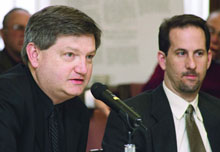
March 14, 2006 — The 2006 Goldsmith Prize for Investigative Reporting has been awarded to James Risen and Eric Lichtblau of the New York Times by the Joan Shorenstein Center on the Press, Politics and Public Policy for their investigative report “Domestic Spying.”
- Watch the Video
- Read the Ceremony transcript
- Read the Seminar transcript
The Times revealed that the government, in the name of national security, was systematically tapping into international telephone calls and e-mail traffic in the U.S. without court warrants. Risen and Lichtblau’s uncovering of this issue has created a national debate over what is necessary surveillance and what is a blatant violation of the law and an infringement on civil liberties.
“The judges felt that, in a field of hugely important investigations, the revelation of systematic domestic spying by the government was the most important,” said Alex S. Jones, director of the Joan Shorenstein Center on the Press, Politics and Public Policy. “They wanted to send a message that this kind of reporting is essential to our democracy.”
Launched in 1991, the Goldsmith Prize for Investigative Reporting honors journalism which promotes more effective and ethical conduct of government, the making of public policy, or the practice of politics by disclosing excessive secrecy, impropriety and mismanagement.
The five finalists for the Goldsmith Prize for Investigative Reporting were as follows:
Joshua Boak, James Drew, Steve Eder, Christopher D. Kirkpatrick, Jim Tankersley and Mike Wilkinson, of the Blade (Toledo, OH) for “Uncovering ‘Coingate’”
An inquiry into Ohio’s curious investment in rare coins led to an investigation culminating in convictions of the governor and others and exposure of illegal campaign contributions.
Marcus Stern and Jerry Kammer, of the Copley News Service for “Randy ‘Duke’ Cunningham”
Reporting by Stern and Kammer led to the resignation of Rep. Randy “Duke” Cunningham (R-CA) after they revealed Cunningham had taken $2.4 million in bribes.
Evelyn Larrubia, Robin Fields and Jack Leonard, of the Los Angeles Times for “Guardians for Profit”
Their series exposed how a new breed of entrepreneur has entered the field of guardianship of the elderly, victimizing older Americans by charging them exorbitant fees, neglecting their needs and sometimes looting their assets.
Susan Schmidt, James V. Grimaldi and R. Jeffrey Smith of the Washington Post for “The Abramoff Scandal”
Throughout 2005, in articles that broke the major revelations, the Post unraveled Abramoff’s web and his ties to then-House Majority Leader Tom DeLay.
Dana Priest of the Washington Post for “The CIA’s Secret War Against Terrorism”
Her series of articles have uncovered the inner workings, successes and failures of the CIA’s global effort to kill, capture and interrogate suspected terrorists, revealing the existence of a network of secret prisons outside the U.S.
A special award of recognition also was presented to Nicholas D. Kristof of the New York Times for “The Genocide in Darfur.” Kristof exposed the savagery plaguing Sudan that the world might not have otherwise seen. Through his dogged reporting, he is responsible for saving many thousands of lives.
The Goldsmith Book Prize is awarded to the best academic and best trade books that seek to improve the quality of government or politics through an examination of press and politics in the formation of public policy.
The Goldsmith Book Prize for best academic book was awarded to James A. Stimson for Tides of Consent: How Public Opinion Shapes American Politics. The prize for best trade book went to Geoffrey R. Stone for Perilous Times: Free Speech in Wartime from the Sedition Act of 1798 to the War on Terrorism.
The Goldsmith Career Award for Excellence in Journalism was given to Jim Lehrer, executive editor and anchor of The News Hour with Jim Lehrer.
The annual Goldsmith Awards Program is funded by the Greenfield Foundation.

